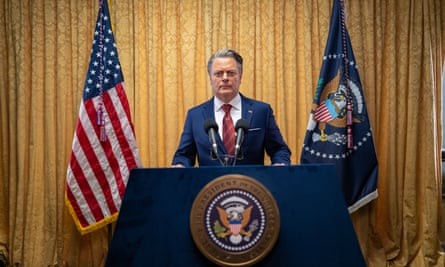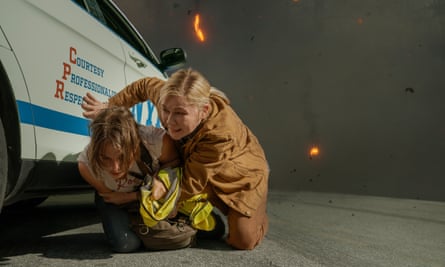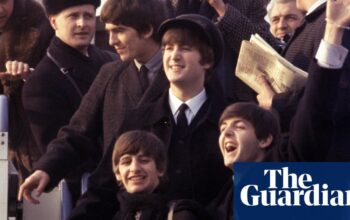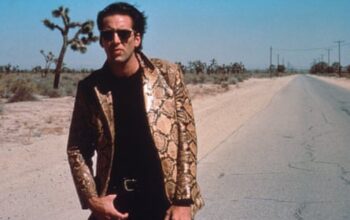Alex Garland smiles broadly only once while in my company, and it’s when I’m about to leave. As I put on my coat and say goodbye, an irrepressible and unmistakable grin of relief spreads across the film-maker’s face. I don’t take it personally – and Garland is unfailingly courteous throughout our conversation – but this seems indicative of both his serious character in general, and his uneasy mood at present. I wonder if it is partly due to filmgoers like me, with our insistent (mis)interpretation of his work, that Garland says that his latest film will also be the last he directs.
And what a way to go out. With a rumoured $50m budget, Civil War is the most expensive film ever made by indie production house A24, and on an epic scale that surpasses Garland’s previous, also ambitious, films. Plus, if you thought the gender politics of his 2022 folk horror Men were confrontational, or that the ambiguity of 2018 sci-fi thriller Annihilation was courageous, or the take-down of tech billionaires in 2015’s Ex-Machina provocative … Well then, try putting out a US-set action thriller called Civil War in a presidential election year.
Kirsten Dunst stars as Lee, a hardbitten photojournalist who leads a group of war correspondents on a road trip towards the conflict’s front line. They’re used to reporting on stories abroad, but as the film opens, the US is already deep into a devastating civil war (cause unspecified) that has turned the sight of tanks rolling down 5th Avenue into a near-everyday occurrence. Still, Lee and her companions are determined to report on their county’s demise, whatever the cost to their own mental or moral health. “There is something in the film which is trying to be protective of [journalists],” says Garland. His father was a longtime newspaper cartoonist, and you can sense an admiration for that old guard of foreign correspondents he grew up around in London. “I think serious journalism needs protecting, because it’s under attack, so I wanted to make those people ‘heroes’ to put them front and centre.”
We are speaking in a small meeting room at DNA Films, Garland’s production partners since his zeitgeist-defining debut novel The Beach became a Leonardo DiCaprio-starring movie in 2000. Between that and Ex Machina – Garland’s directorial debut – came a string of screenwriting credits, beginning with 2002’s 28 Days Later. The zombie thriller gave Oscar-winner Cillian Murphy his first big film lead, playing a bike courier who wakes from a coma into a post-apocalyptic London, and has become a cult favourite: fans have been clamouring for a proper sequel ever since (more on that later.)
It seems fair to say then that everything’s been going swimmingly in Garland’s career for nearly three decades; in addition to the feature films, there have been video games and the Silicon Valley sci-fi TV series Devs. That’s why, when I read an interview conducted during Civil War’s shoot, in which he declared his intention to give up directing and retreat to only writing, I assume they must have caught him on a bad day. Here, now, surrounded by framed posters of his past triumphs and with his latest opus ready for release, does he still feel the same? “Nothing’s changed,” he says flatly. “I’m in a very similar state. I’m not planning to direct again in the foreseeable future.”
It often happens that acclaimed indie directors rise in industry status, only to discover that with bigger budgets come greater creative restrictions. But Garland, who is full of praise for A24, says that isn’t it: “The pressure doesn’t come from the money. It comes from the fact that you’re asking people to trust something that, on the face of it, doesn’t look very trustworthy.” He gives, as an example, sitting in a car park outside Atlanta, asking his Civil War cast to believe that one day the VFX blue screen behind them will be a night sky lit up by mortar fire. Or on Ex Machina where, “Alicia [Vikander] and Sonoya [Mizuno] are trusting that nudity is going to be dealt with thoughtfully and respectfully … [when] cinema leans towards not doing that.”
This is the deep sense of responsibility to cast and crew that “literally keeps me awake at night”. He is less burdened by the controversies that have been swirling around Civil War since long before anyone had actually seen it. Namely, that it is reckless – or at least in poor taste – to release such a film at a time in American history when insurrectionary violence seems like a realistic possibility.

You needn’t spend long with Garland to realise the injustice of that accusation. He is always considered in his responses, typically offering up several alternative answers to a single question, and then self-reflexively evaluating the relative accuracy of each. (“Now, I could then give another answer, which would be a post-rationalised sort of answer, but I’m not sure it’d be true …”). He can also expound at length on how sensationalised violence became coded into the grammar of film – a plausible theory involving second world war veteran film-makers, and the use of squibs (exploding blood capsules) in 1967 crime classic Bonnie and Clyde – and then goes into detail on the technical ways in which Civil War’s shootouts subvert this grammar. There’s no “cable snapping someone backwards and a big fountain of blood flying up a wall”, he says; instead, as more often happens in real life, people who’ve been shot simply fall over. “What I think, or hope, that does is that it slightly reframes [the violent action] in audiences’ minds.”
He began work on Civil War around 2018, observing the world and “feeling surprised that there wasn’t more civil disobedience” going on. Since those years saw protests over a range of issues – pro-Trump, anti-Trump, gun control, climate change and Brexit to name a few – I ask what, specifically, he was surprised that people weren’t marching in the streets about. This provokes a look of ferocious incredulity. “Is that a real question? I mean are you kidding? There were a holistic set of problems, globally. Not least in the country where I live [UK], or in the country I’ve been working [US]. There’s a lot to be very concerned about.”
In any case, he then set aside the unfinished screenplay for a few years until, in 2020, things got even worse. Garland contracted Covid early on in the pandemic and was “really quite sick” for a while, resulting in a time-jump sensation reminiscent of the opening scenes of 28 Days Later. “I came out of it into a world that was in a state of real agitation. All sorts of fractures were becoming more fractured and paranoid concerns becoming more paranoid.” He wrote two screenplays back-to-back – Civil War first, then Men – and in the process his varied, inchoate anxieties took the shape of one underlying concern: “It’s polarisation. You could see that everywhere. And you could see it getting magnified.”
Garland’s sombre, anti-war stance doesn’t prevent Civil War from producing some awe-inspiring spectacles of US military might, with helicopters a recurring motif. “They’re very visceral objects and experiences,” he explains. “They make much more noise than people expect, and the noise has a kind of fast, heartbeat pulse in it, that your own pulse rate matches. I’ve done a lot of flying in helicopters for one reason or another. Not least work, actually.”
This conjures up an image of Garland arriving to set in a chopper, to the strains of Ride of the Valkyries, perhaps, like Apocalypse Now’s Lt Col Kilgore. Is directing films on the scale of Civil War a bit like being a US military general? “No,” he frowns. “It’s a management job. It’s more like trying to make HS2, I suspect.”
after newsletter promotion

This is an offhand comparison, but an apt one. Like Sir Jonathan Thompson, the civil servant who was appointed chair of the high-speed rail infrastructure project, Garland seems determined to stay out of the fray which attends his highly political project. In Civil War’s version of the near future, the entrenched Democrat state of California and the entrenched Republican state of Texas are aligned as the “Western Forces” against the federal government, though neither they, nor the federal army, evince any distinguishing political ideology. The film’s warning against our descent into dystopia is urgent and sincere, but it simultaneously declines to map out the specific arguments and ideas that might take us there. Why is Garland both-sidesing like this?
He’s not, he says. But he recognises this as a potential misinterpretation of a film that posits “polarisation” as cause – not a symptom – of our current malaise. The film is concerned about “the speed at which the other side shuts down” when we talk to people in different political positions. “[I am] trying to circumvent that by not being polarising, and by trying to find points of agreement.” This is the same approach he’s always taken to his work. “What I’m usually doing in films is presenting more than one opinion, so it’s more like a conversation, rather than: ‘Do this, think that’. So there are several ways you could look at Ex Machina; as a film about sentience, or where gender resides, or objectification. The same is true of Men. And somewhere, coded within that, I will be taking a position. But I’ve tried to do it in a way that isn’t interrupting the conversation.”
He does, however, seem to be having much less fun with the unpredictable way people might participate in this conversation when it comes to Civil War, at one point requesting to go off-record so he can explain his personal views and voting preferences. Yet while Garland clearly cares about how his film will be received, and returns fretfully to the subject of media misinterpretation on several occasions, he seems to be in a place of peaceable, if gloomy, acceptance: “It all could and will be misunderstood”, and “it would be out of your control as it is out of mine”.
He would rather talk about the ex Navy Seal and military adviser on Civil War Ray Mendoza, who is now directing his first feature, with Garland’s support (Garland will be co-directing, not directing, he clarifies). “I respect him a great deal, though we’re very different.” That they can still collaborate well shows “the problem with polarisation”, he says. And then there’s the – now confirmed – 28 Years Later, which he’s writing and will see him reuniting with Danny Boyle (a sequel to the original film, 28 Weeks Later, was released in 2007, though with Boyle and Garland only as executive producers.) If, as he says he’s come to accept, his books and films are less like babies and more like 18- or 19-year-olds, “that can and probably should go out into the world and do their own things”, then this zombie franchise is a favourite child, always welcome to boomerang back home with Dad: “A whole idea for a trilogy just sort of came – bing! – into my head,” he says with wonder. “It makes me really question what creativity is. I feel like an observer, a lot of the time.”
I have to say, listening to Garland speak so passionately about these ongoing projects, he doesn’t sound like a man who’s fallen out of love with film-making. “No, I have,” he insists, serious again. “I do actually love film, but film-making doesn’t exist in a vacuum. It exists in a life and also in a broader context. I have to interact, in a way – without being rude – like this …” He gestures towards me, the Guardian journalist with the dictaphone. No offence taken.
Civil War is in cinemas from 12 April.
Source: theguardian.com


